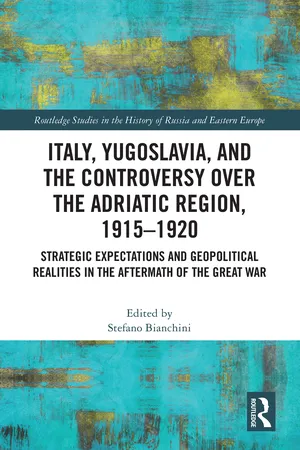
Italy, Yugoslavia, and the Controversy over the Adriatic Region, 1915-1920
Strategic Expectations and Geopolitical Realities in the Aftermath of the Great War
- 326 pages
- English
- ePUB (mobile friendly)
- Available on iOS & Android
Italy, Yugoslavia, and the Controversy over the Adriatic Region, 1915-1920
Strategic Expectations and Geopolitical Realities in the Aftermath of the Great War
About This Book
This book explores the path that led to the Treaty of Rapallo (1920) between Italy and the new Kingdom of the Serbs, Croats and Slovenes, later the Kingdom of Yugoslavia, in the aftermath of the First World War, when the territories of the former Austro-Hungarian Empire were allotted to new and existing states, with regard as far as possible to the nationalities of the people living in the various territories in addition to the future of Montenegro and Albania.
Based on vast archival documentation and published sources, the contributors to this book discuss the nature of the disputes which arose in the Adriatic area, often as the result of the inhabitants of the different territories being of several nationalities, and examine how the disputes were concluded. The book charts the disappointments of both Italians and Yugoslavs, the Italians disappointed that the terms of the Treaty of London of 1915, which promised Dalmatia to Italy in return for Italy entering the war against the Austro-Hungarian Empire, were not fulfilled. The Yugoslavs were disappointed loosing territories containing large Yugoslav populations. The volume considers public opinion, the words, positions and actions of leading politicians, and the continuing consequences of the settlement, many of them adverse consequences for particular cities and localities.
Presenting a comprehensive approach to the Adriatic controversy, this book will be of interest to those studying European history of international relations, diplomatic negotiations and nationalism, modern history, Central Asian, Eastern European and Russian Studies.
Frequently asked questions
Table of contents
- Cover
- Half-Title Page
- Series Page
- Title Page
- Copyright Page
- Table of Contents
- List of Contributors
- List of archives with acronyms
- Maps
- At the origins of the Adriatic controversy: An introduction1
- Part I The Adriatic question a century later: Reassessing geopolitical expectations and diplomatic realities
- Part II The Adratic question: Intellectuals and public opinion debates
- Index